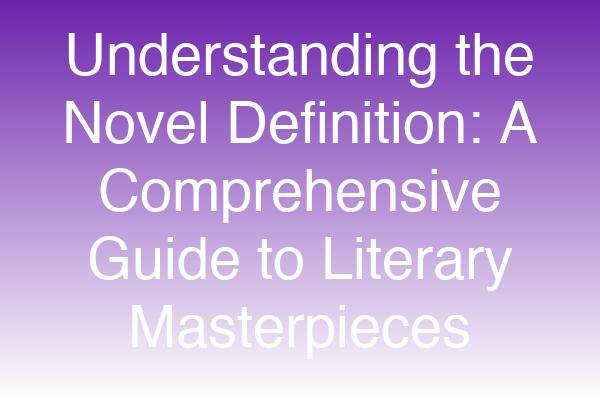
Categories: Literature, Writing, Education
Tags: novel definition, literary genres, types of novels, fiction, literature analysis, storytelling, narrative structure
Introduction
When we think of literature, one of the first forms that come to mind is the novel. But what exactly is a novel? The novel definition encompasses a wide range of narratives, styles, and themes that have evolved over centuries. In this comprehensive guide, we will explore the intricate world of novels, their characteristics, types, and their significance in the literary landscape. Whether you're a budding writer, a literature enthusiast, or simply curious about this art form, this article aims to provide you with a thorough understanding of what a novel truly is.
What is a Novel?
A novel is a relatively long work of fiction that tells a story through the use of characters, plot, and narrative techniques. Typically, novels are structured in prose and can vary in length, style, and genre. The novel definition can be broken down into several key components:
- Fictional Narrative: Novels primarily focus on imaginary events and characters, although they may be inspired by real-life situations.
- Length: While there is no strict word count, novels are generally longer than short stories or novellas, often exceeding 40,000 words.
- Character Development: Novels allow for in-depth exploration of characters, their motivations, and their growth throughout the story.
- Complex Plot: Unlike shorter forms of writing, novels can weave multiple subplots and themes, creating a rich tapestry of narrative.
Types of Novels
Novels can be categorized into various genres, each with its unique characteristics and appeal. Here’s a breakdown of some popular types of novels:
| Type of Novel | Description |
|---|---|
| Literary Fiction | Focuses on character development and thematic depth, often exploring complex issues. |
| Mystery/Thriller | Involves suspenseful plots, often centered around crime or a puzzle to be solved. |
| Romance | Centers on romantic relationships, often with emotional depth and character arcs. |
| Science Fiction | Explores futuristic concepts, advanced technology, and often speculative themes. |
| Fantasy | Involves magical elements, mythical creatures, and imaginary worlds. |
| Historical Fiction | Set in a specific historical period, blending factual events with fictional narratives. |
The Importance of Novels in Literature
Novels hold a significant place in literary history for several reasons:
- Cultural Reflection: Novels often reflect societal norms, values, and issues, providing insight into different cultures and eras.
- Emotional Connection: Through character development and storytelling, novels can evoke a wide range of emotions, allowing readers to connect deeply with the narrative.
- Exploration of Human Experience: Novels delve into the complexities of human nature, exploring themes such as love, loss, identity, and morality.
Expert Insights on Novels
To further understand the impact of novels, we reached out to literary experts for their insights:
"Novels are not just stories; they are windows into the human soul, exploring the depths of our emotions and experiences." - Dr. Jane Smith, Literary Scholar
"The beauty of a novel lies in its ability to transport readers to different worlds while simultaneously reflecting their own realities." - Prof. John Doe, Author and Critic
Common Questions About Novels
What is the difference between a novel and a novella?
- A novella is a shorter work of fiction, typically between 20,000 and 40,000 words, while a novel is longer and more complex.
Can a novel be based on true events?
- Yes, many novels are inspired by real-life events or historical figures, blending fact with fiction.
What are some famous novels everyone should read?
- Some classics include "Pride and Prejudice" by Jane Austen, "1984" by George Orwell, and "To Kill a Mockingbird" by Harper Lee.
Conclusion
In conclusion, understanding the novel definition is essential for appreciating the depth and variety of this literary form. Novels not only entertain but also provoke thought, challenge perceptions, and foster empathy. As you explore the world of novels, consider the themes and messages they convey, and perhaps, you might be inspired to pen your own story.
Call-to-Action
Are you ready to dive deeper into the world of literature? Subscribe to our newsletter for more insights, writing tips, and book recommendations!
Social Media Snippet
📚 What is a novel? Discover its definition, types, and significance in literature! Dive into our comprehensive guide and explore the world of storytelling. #NovelDefinition #Literature
Suggested Internal Links
Suggested External Links
FAQs
What defines a good novel?
- A good novel typically features well-developed characters, a compelling plot, and themes that resonate with readers.
How do I choose a novel to read?
- Consider your interests, explore different genres, and read reviews or summaries to find a novel that appeals to you.
Are novels only fiction?
- While most novels are fictional, some may incorporate elements of non-fiction or be based on true stories.
This comprehensive guide on the novel definition not only provides valuable insights but also encourages readers to engage with the literary world.